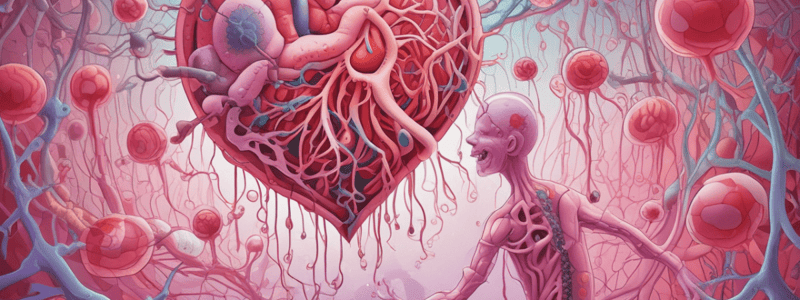Podcast
Questions and Answers
What distinguishes septicemia from bacteremia?
What distinguishes septicemia from bacteremia?
- Bacteremia is more severe than septicemia.
- Septicemia is characterized by the presence of bacteria in the blood without symptoms.
- Septicemia only occurs during surgical procedures.
- Septicemia involves systemic inflammatory response syndrome due to infection. (correct)
Which of the following describes acute endocarditis?
Which of the following describes acute endocarditis?
- It occurs suddenly and presents severe symptoms. (correct)
- It is always caused by viral infections.
- It typically develops gradually and has non-specific symptoms.
- It only affects individuals with pre-existing heart conditions.
Which statement about Ebola virus symptoms is accurate?
Which statement about Ebola virus symptoms is accurate?
- Symptoms manifest primarily as respiratory distress initially.
- Symptoms include fever, severe headache, and gastrointestinal bleeding. (correct)
- Symptoms do not develop until after a three-week incubation period.
- It commonly presents with a rash in the early stages.
What is a typical treatment option for Hanta virus infections?
What is a typical treatment option for Hanta virus infections?
Which of the following correctly identifies West Nile virus signs?
Which of the following correctly identifies West Nile virus signs?
Study Notes
Bacterial Systemic Infections
-
Syphilis:
- Causative agent: Treponema pallidum
- Signs and symptoms: Primary sores, rash, fever, swollen lymph nodes, and can cause serious complications if untreated.
- Treatment: Antibiotics, commonly penicillin.
-
Lemierre's Syndrome:
- Causative agent: Fusobacterium necrophorum
- Signs and symptoms: Sore throat, septic thrombophlebitis, and embolic complications affecting lungs.
- Treatment: Antibiotics and possible surgical drainage.
-
Tularemia:
- Causative agent: Francisella tularensis
- Signs and symptoms: Fever, skin ulcers, swollen lymph nodes, and respiratory issues.
- Treatment: Antibiotics, typically doxycycline or streptomycin.
Distinction Between Bacteremia and Septicemia
- Bacteremia: Presence of bacteria in the bloodstream, may be transient and often resolves on its own without severe symptoms.
- Septicemia: A more severe condition with systemic infection due to bacteria released into the blood, leading to sepsis, characterized by fever, chills, and potentially life-threatening organ dysfunction.
Distinction Between Acute and Subacute Endocarditis
- Acute Endocarditis: Rapid onset, often caused by virulent organisms like Staphylococcus aureus, leading to severe symptoms such as high fever and heart murmur, and requires immediate treatment.
- Subacute Endocarditis: Slower onset, typically caused by less virulent organisms, affecting those with pre-existing heart conditions, presenting with mild and nonspecific symptoms such as fatigue and low-grade fever.
Viral Diseases
-
Ebola Virus:
- Causative agent: Ebola virus
- Signs and symptoms: High fever, bleeding, vomiting, and diarrhea.
- Treatment: Supportive care and antiviral treatments (e.g., monoclonal antibodies).
-
Hanta Virus:
- Causative agent: Hantavirus
- Signs and symptoms: Fever, muscle aches, gastrointestinal symptoms, and respiratory distress.
- Treatment: Supportive care; no specific antiviral treatment.
-
West Nile Virus:
- Causative agent: West Nile virus
- Signs and symptoms: Fever, headache, body aches, and in severe cases, neurological complications.
- Treatment: Supportive care; no specific antiviral treatment.
Studying That Suits You
Use AI to generate personalized quizzes and flashcards to suit your learning preferences.
Description
Test your knowledge on bacterial systemic infections as well as key viral diseases affecting the cardiovascular and lymphatic systems. This quiz covers aspects like causative agents, symptoms, and treatments, while also distinguishing between critical categories such as bacteremia and septicemia. Perfect for students of medical sciences!




